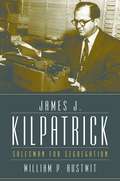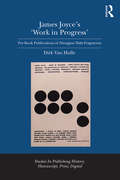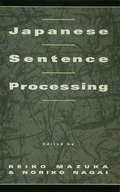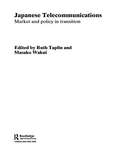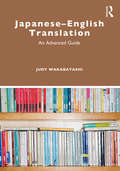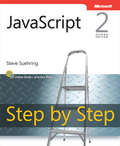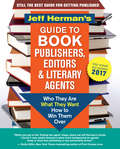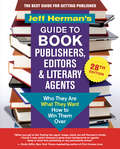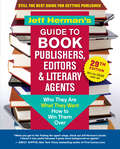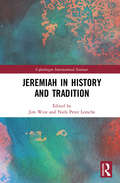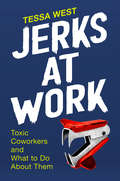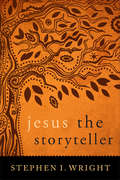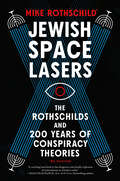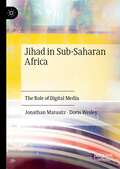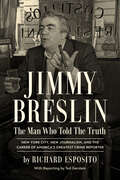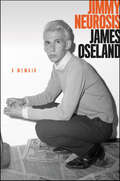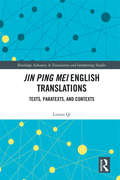- Table View
- List View
James J. Kilpatrick
by William P. HustwitJames J. Kilpatrick was a nationally known television personality, journalist, and columnist whose conservative voice rang out loudly and widely through the twentieth century. As editor of the Richmond News Leader, writer for the National Review, debater in the "Point/Counterpoint" portion of CBS's 60 Minutes, and supporter of conservative political candidates like Barry Goldwater, Kilpatrick had many platforms for his race-based brand of southern conservatism. In James J. Kilpatrick: Salesman for Segregation, William Hustwit delivers a comprehensive study of Kilpatrick's importance to the civil rights era and explores how his protracted resistance to both desegregation and egalitarianism culminated in an enduring form of conservatism that revealed a nation's unease with racial change.Relying on archival sources, including Kilpatrick's personal papers, Hustwit provides an invaluable look at what Gunnar Myrdal called the race problem in the "white mind" at the intersection of the postwar conservative and civil rights movements. Growing out of a painful family history and strongly conservative political cultures, Kilpatrick's personal values and self-interested opportunism contributed to America's ongoing struggles with race and reform.
James Joyce's 'Work in Progress': Pre-Book Publications of Finnegans Wake Fragments (Studies in Publishing History: Manuscript, Print, Digital)
by Dirk Van HulleThe text of Finnegans Wake is not as monolithic as it might seem. It grew out of a set of short vignettes, sections and fragments. Several of these sections, which James Joyce confidently claimed would "fuse of themselves", are still recognizable in the text of Finnegans Wake. And while they are undeniably integrated very skillfully, they also function separately. In this publication history, Dirk Van Hulle examines the interaction between the private composition process and the public life of Joyce's 'Work in Progress', from the creation of the separate sections through their publication in periodicals and as separately published sections. Van Hulle highlights the beautifully crafted editions published by fine arts presses and Joyce's encouragement of his daughter's creative talents, even as his own creative process was slowing down in the 1930s. All of these pre-book publications were "alive" in both bibliographic and textual terms, as Joyce continually changed the texts in order to prepare the book publication of Finnegans Wake. Van Hulle's book offers a fresh perspective on these texts, showing that they are not just preparatory versions of Finnegans Wake but a 'Work in Progress' in their own right.
Jane Grey Swisshelm: An Unconventional Life, 1815-1884
by Sylvia D. HoffertNineteenth-century newspaper editor Jane Grey Swisshelm (1815-1884) was an unconventionally ambitious woman. While she struggled in private to be a dutiful daughter, wife, and mother, she publicly critiqued and successfully challenged gender conventions that restricted her personal behavior, limited her political and economic opportunities, and attempted to silence her voice. As the owner and editor of newspapers in Pittsburgh; St. Cloud, Minnesota; and Washington, D.C.; and as one of the founders of the Minnesota Republican Party, Swisshelm negotiated a significant place for herself in the male-dominated world of commerce, journalism, and politics. How she accomplished this feat; what expressive devices she used; what social, economic, and political tensions resulted from her efforts; and how those tensions were resolved are the central questions examined in this biography. Sylvia Hoffert arranges the book topically, rather than chronologically, to include Swisshelm in the broader issues of the day, such as women's involvement in politics and religion, their role in the workplace, and marriage. Rescuing this prominent feminist from obscurity, Hoffert shows how Swisshelm laid the groundwork for the "New Woman" of the turn of the century.
Japanese Politeness: An Enquiry
by Yasuko ObanaAlthough Japanese language is one of the most quoted examples in politeness research, extant publications focus on particular areas of politeness, and very few of them enquire into varied aspects of Japanese politeness. In this book, Yasuko Obana provides an integrated account of what signifies Japanese politeness. By examining how far previous assumptions can apply to Japanese, Obana exposes a variety of characteristics of Japanese politeness. By taking a diachronic approach, she probes into what constitutes politeness, extracts key elements of the term ‘polite’ in Japanese, and demonstrates how modern honorifics’ apparent diverse, divergent uses and effects can be integrated into a systematic matrix. Furthermore, by quoting traditional Japanese language scholars’ (kokugo gakusha) studies, Obana brings different views into the open. She also carves out politeness strategies in Japanese that have not been adequately explored to date. They often conform to the way in which honorifics behave because they often reflect social indexicality. This book is a good reference for scholars in pragmatics, particularly for those who are working on politeness. It is useful for Japanese language teachers who want to know how to teach Japanese politeness to non-native learners. Postgraduate students of Japanese or pragmatics will also find this book useful as a self-study book.
Japanese Sentence Processing
by Reiko Mazuka Noriko NagaiThis volume is a direct result of the International Symposium on Japanese Sentence Processing held at Duke University. The symposium provided the first opportunity for researchers in three disciplinary areas from both Japan and the United States to participate in a conference where they could discuss issues concerning Japanese syntactic processing. The goals of the symposium were three-fold: * to illuminate the mechanisms of Japanese sentence processing from the viewpoints of linguistics, psycholinguistics and computer science; * to synthesize findings about the mechanisms of Japanese sentence processing by researchers in these three fields in Japan and the United States; * to lay foundations for future interdisciplinary research in Japanese sentence processing, as well as international collaborations between researchers in Japan and the United States. The chapters in this volume have been written from the points of view of three different disciplines, with various immediate objectives -- from building usable speech understanding systems to investigating the nature of competence grammars for natural languages. All of the papers share the long term goal of understanding the nature of human language processing mechanisms. The book is concerned with two central issues -- the universality of language processing mechanisms, and the nature of the relation between the components of linguistic knowledge and language processing. This volume demonstrates that interdisciplinary research can be fruitful, and provides groundwork for further research in Japanese sentence processing.
Japanese Telecommunications: Market and Policy in Transition (Routledge Studies in the Growth Economies of Asia)
by Ruth Taplin Masako WakuiPresenting a comprehensive survey of the telecommunications industry in Japan, Taplin and Wakui cover the different sectors of the industry – including mobile, broadband and satellite, whilst considering key questions such as the structure and economics of the industry, government policy, and international relations issues connected to the industry. The volume brings together unique analysis by renowned experts in the telecommunications field. One major overall problem is that, unlike many other industries, Japan has lagged behind other countries in telecommunications. Japanese Telecommunications considers why this should be so, showing how far this is attributable to an unmodernized industry structure, and assessing the measures being taken to address the problem. After over a decade of struggle, Japan has recorded rapid uptake of broadband, and Japanese advanced mobile services have become increasingly successful on a global scale. Japan has also undergone regulatory reform, and competition policy is now given top priority by government. Taplin and Wakui examine the most recent developments and provide signposts for the future.
Japanese–English Translation: An Advanced Guide
by Judy WakabayashiThis volume is a textbook for aspiring translators of Japanese into English, as well as a reference work for professional Japanese–English translators and for translator educators. Underpinned by sound theoretical principles, it provides a solid foundation in the practice of Japanese–English translation, then extends this to more advanced levels. Features include: 13 thematic chapters, with subsections that explore common pitfalls and challenges facing Japanese–English translators and the pros and cons of different procedures exercises after many of these subsections abundant examples drawn from a variety of text types and genres and translated by many different translators This is an essential resource for postgraduate students of Japanese–English translation and Japanese language, professional Japanese–English translators and translator educators. It will also be of use and interest to advanced undergraduates studying Japanese.
Jasper the Badger: Targeting the j Sound (Speech Bubbles 2)
by Melissa PalmerJasper the badger has a plan to get some peace and quiet so he can eat his piece of fudge by himself. But will his plan work? This picture book targets the /j/ sound and is part of Speech Bubbles 2, a series of picture books that target specific speech sounds within the story. The series can be used for children receiving speech therapy, for children who have a speech sound delay/disorder, or simply as an activity for children’s speech sound development and/or phonological awareness. They are ideal for use by parents, teachers or caregivers. Bright pictures and a fun story create an engaging activity perfect for sound awareness. Picture books are sold individually, or in a pack. There are currently two packs available – Speech Bubbles 1 and Speech Bubbles 2. Please see further titles in the series for stories targeting other speech sounds.
Java Memory Management: A comprehensive guide to garbage collection and JVM tuning
by Sean Kennedy Maaike van PuttenImprove application performance by tuning, monitoring and profiling both the garbage collector and JVMKey FeaturesUnderstand the different parts of Java memory and the various garbage collectors so you can select your preferred oneExplore how memory management can help to effectively improve performanceLearn how to spot and avoid memory leaks to enhance application performanceBook DescriptionUnderstanding how Java organizes memory is important for every Java professional, but this particular topic is a common knowledge gap for many software professionals. Having in-depth knowledge of memory functioning and management is incredibly useful in writing and analyzing code, as well as debugging memory problems. In fact, it can be just the knowledge you need to level up your skills and career.In this book, you'll start by working through the basics of Java memory. After that, you'll dive into the different segments individually. You'll explore the stack, the heap, and the Metaspace. Next, you'll be ready to delve into JVM standard garbage collectors. The book will also show you how to tune, monitor and profile JVM memory management. Later chapters will guide you on how to avoid and spot memory leaks.By the end of this book, you'll have understood how Java manages memory and how to customize it for the benefit of your applications.What you will learnUnderstand the schematics of debugging and how to design the application to perform wellDiscover how garbage collectors workDistinguish between various garbage collector implementationsIdentify the metrics required for analyzing application performanceConfigure and monitor JVM memory managementIdentify and solve memory leaksWho this book is forThis book is for all levels of Java professionals, regardless of whether you're a junior or senior developer, a DevOps engineer, a tester, or the system admin of a Java application. If you currently don't have in-depth knowledge of Java memory, garbage collection, and/or JVM tuning, then this book will help you to take your Java skills to the next level.
Java Message Service
by Richard Monson-Haefel Dave ChappellThis book is a thorough introduction to Java Message Service (JMS) from Sun Microsystems. It shows how to build applications using the point-to-point and publish-and-subscribe models; use features like transactions and durable subscriptions to make applications reliable; and use messaging within Enterprise JavaBeans. It also introduces a new EJB type, the MessageDrivenBean, that is part of EJB 2.0, and discusses integration of messaging into J2EE.
JavaScript Step by Step
by Steve SuehringYour hands-on, step-by-step guide to the fundamentals of JavaScript development. Teach yourself how to program with JavaScript -- one step at time. Ideal for developers with fundamental programming skills, this practical tutorial provides the clear guidance and hands-on examples you need to create or customize interactive Web applications using core JavaScript features and techniques. Discover how to: Write and deploy JavaScript code with Microsoft® Visual Studio® 2010, the Eclipse IDE, or text editors Work with JavaScript syntax and data types Use the Document Object Model to retrieve, create, and change HTML elements Create rollover images and slideshow effects Validate and provide feedback for user input on Web forms Manipulate CSS styles and respond to browser events Develop interactive Web applications using AJAX Help speed development with JavaScript frameworks such as jQuery Your Step by Step digital content includes: All the books practice files -- ready to download and put to work. Fully searchable online edition of this book -- with unlimited access on the Web. The print version of this book includes free digital content online. To download, please visit O'Reilly's web site, search for the title of this book to find its catalog page, and click on the link below the cover image (Examples, Companion Content, or Practice Files). Note that while we provide as much of the media content as we are able via free download, we are sometimes limited by licensing restrictions. Please direct any questions or concerns to booktech@oreilly.com.
Jeff Herman's Guide to Book Publishers, Editors & Literary Agents
by Jeff HermanIf you want to get published, read this book! Jeff Herman's Guide unmasks nonsense, clears confusion, and unlocks secret doorways to success for new and veteran writers! This highly respected resource is used by publishing insiders everywhere and has been read by millions all over the world. Jeff Herman's Guide is the writer's best friend. It reveals the names, interests, and contact information of thousands of agents and editors. It presents invaluable information about more than 350 publishers and imprints (including Canadian and university presses), lists independent book editors who can help you make your work more publisher-friendly, and helps you spot scams. Jeff Herman's Guide unseals the truth about how to outsmart the gatekeepers, break through the barriers, and decipher the hidden codes to getting your book published. Countless writers have achieved their highest aspirations by following Herman's outside-the-box strategies. If you want to reach the top of your game and transform rejections into contracts, you need this book! Jeff Herman's Guide will educate you, inspire you, and become your virtual entourage at every step along the exhilarating journey to publication. Ask anyone in the book business, and they will refer you to Jeff Herman's Guide. NEW for 2015: Comprehensive index listing dozens of subjects and categories to help you find the perfect publisher or agent.
Jeff Herman's Guide to Book Publishers, Editors & Literary Agents 2032: Who They Are, What They Want, How to Win Them Over
by Jeff HermanStill the Best Guide for Getting Published If you want to get published, read this book! Comprehensive index lists dozens of subjects and categories to help you find the perfect publisher or agent. Jeff Herman's Guide unmasks nonsense, clears confusion, and unlocks secret doorways to success for new and veteran writers! This highly respected resource is used by publishing insiders everywhere and has been read by millions all over the world. Jeff Herman's Guide is the writer's best friend. It reveals the names, interests, and contact information of thousands of agents and editors. It presents invaluable information about more than 350 publishers and imprints (including Canadian and university presses), lists independent book editors who can help you make your work more publisher-friendly, and helps you spot scams. Jeff Herman's Guide unseals the truth about how to outsmart the gatekeepers, break through the barriers, and decipher the hidden codes to getting your book published. Countless writers have achieved their highest aspirations by following Herman's outside-the-box strategies. If you want to reach the top of your game and transform rejections into contracts, you need this book!
Jeff Herman's Guide to Book Publishers, Editors & Literary Agents, 28th edition: Who They Are, What They Want, How to Win Them Over
by Jeff HermanIf you want to get published, read this book! Jeff Herman’s Guide unmasks nonsense, clears confusion, and unlocks secret doorways to success for new and veteran writers! This highly respected resource is used by publishing insiders everywhere and has been read by millions all over the world. Jeff Herman’s Guide is the writer’s best friend. It reveals the names, interests, and contact information of hundreds of agents and editors. It presents invaluable information about 245 publishers and imprints, lists independent book editors who can help you make your work more publisher-friendly, and helps you spot scams. Jeff Herman’s Guide unseals the truth about how to outsmart the gatekeepers, break through the barriers, and decipher the hidden codes to getting your book published. Countless writers have achieved their highest aspirations by following Herman’s outside-the-box strategies. If you want to reach the top of your game and transform rejections into contracts, you need this book! Comprehensive index lists dozens of subjects and categories to help you find the perfect publisher or agent.
Jeff Herman’s Guide to Book Publishers, Editors & Literary Agents, 29th Edition: Who They Are, What They Want, How to Win Them Over
by Jeff HermanIf you want to get published, read this book! Jeff Herman’s Guide unmasks nonsense, clears confusion, and unlocks secret doorways to success for new and veteran writers! This highly respected resource is used by publishing insiders everywhere and has been read by millions all over the world. Countless writers have turned to this book to figure out how to decipher the hidden codes to getting published. It reveals: • tools to discern and exploit the rapidly changing publishing environment • the crucial differences between independent houses and the “Big 5” publishers • hard truths about self-publishing • names, interests, and contact information of hundreds of agents and editors • how writers unwittingly disqualify themselves from the consideration they deserve, and how to optimize chances with agents • critical thinking skills for outside-the-box publishing strategies • the nuts and bolts of superior query letters and proposals • how to spot and avoid ever-more-prevalent scams • the value of “book doctors” and when to consider hiring them • what to do — and not do — once you’ve got an editor or publisher interested Herman’s book remains the go-to guide for everything anyone ever wanted to know about book publishing. Comprehensive index lists dozens of subjects and categories to help you find the perfect publisher or agent.
Jeremiah in History and Tradition (Copenhagen International Seminar)
by Jim West Niels Peter LemcheJeremiah in History and Tradition examines aspects of the Book of Jeremiah from a variety of perspectives including historical, textual, redaction, and feminist criticism, as well as the history of its reception. The book looks afresh at the Book of Jeremiah through the lens of intertextuality and reception history in the broadest sense, exploring Jeremiah in its historical context as well as the later history and interpretation of the text, and also reconsidering aspects of the Book of Jeremiah’s traditions. This volume features essays from a unique assembly of scholars, both seasoned and new. It is divided into two parts: "Jeremiah in History", which explores a variety of readings of Jeremiah from the point of view of classical historical criticism; and "Jeremiah in Tradition", which discusses the portraits and use of both the book and the figure of Jeremiah in extra-biblical traditions. Offering challenging new theories, Jeremiah in History and Tradition is invaluable to scholars and students in the field of Biblical Studies. It is a useful resource for anyone working on the interpretation of the biblical text and the readings of the text of Jeremiah throughout history.
Jerks at Work: Toxic Coworkers and What to Do About Them
by Tessa WestA practical and hilarious guide to getting difficult people off your back, for anyone pulling their hair out over an irritating colleague who's not technically breaking any rulesFrom open floor plans and Zoom calls to Slack channels, the workplace has changed a lot over the years. But there&’s one thing that never changes: you&’ll always encounter jerks. Jerks at Work is the definitive guide to dealing with—and ultimately breaking free from—the overbearing bosses, irritating coworkers, and all-around difficult people who make work and life miserable. Social psychologist Tessa West has spent years leveraging science to help people solve interpersonal conflicts in the workplace. What she discovered is that most of our go-to tactics don&’t work because they fail to address the specific motivations that drive bad behavior. In this book, she takes you on a rollicking deep dive of the seven jerks you&’re most likely to encounter at the office, drawing on decades of original research to expose their inner workings and weak points—and ultimately deliver an effective game plan for stopping each type before they take you down with them. Jerks at Work is packed with everyday examples and clever strategies, such as how to: • Stop a Bulldozer from gaining influence by making sure they're not the first to speak up in meetings • Report a Kiss Up/Kick Downer to a manager who idolizes them without looking like the bad guy • Protect your high-achieving team from Free Riders without stifling collaboration • Use a Gaslighter&’s tactics to beat them at their own game For anyone who&’s said &“I can&’t stand that jerk!&” more times than they&’d like to admit, Jerks at Work is the ultimate playbook you wish you didn&’t need but will always turn to.
Jesus The Storyteller
by Stephen I. WrightWhile it is widely acknowledged that Jesus told stories, there has not been much focus on why he did so and how these stories contributed to his ministry. Stephen Wright approaches this topic afresh to analyze how considering the parables as "stories" can help our understanding of Jesus and his mission. Wright begins by looking for insights in scholarship from recent decades on the parables and the historical Jesus. He goes on to imagine how these stories would have resonated with hearers in each of the Synoptic Gospels and considers the dynamics between Jesus and his hearers in different locations like Galilee and Jerusalem. Finally, Wright considers the purpose of these parables as an element of Jesus' ministry and looks at Jesus himself as a storyteller. This book will provide a solid basis for understanding why Jesus spoke in parables and how this distinctive style of speech functioned in his ministry.
Jewish Languages from A to Z
by Lily Kahn Aaron D. RubinJewish Languages from A to Z provides an engaging and enjoyable overview of the rich variety of languages spoken and written by Jews over the past three thousand years. The book covers more than 50 different languages and language varieties. These include not only well-known Jewish languages like Hebrew, Yiddish, and Ladino, but also more exotic languages like Chinese, Esperanto, Malayalam, and Zulu, all of which have a fascinating Jewish story to be told. Each chapter presents the special features of the language variety in question, a discussion of the history of the associated Jewish community, and some examples of literature and other texts produced in it. The book thus takes readers on a stimulating voyage around the Jewish world, from ancient Babylonia to 21st-century New York, via such diverse locations as Tajikistan, South Africa, and the Caribbean. The chapters are accompanied by numerous full-colour photographs of the literary treasures produced by Jewish language-speaking communities, from ancient stone inscriptions to medieval illuminated manuscripts to contemporary novels and newspapers. This comprehensive survey of Jewish languages is designed to be accessible to all readers with an interest in languages or history, regardless of their background—no prior knowledge of linguistics or Jewish history is assumed.
Jewish Space Lasers: The Rothschilds and 200 Years of Conspiracy Theories
by Mike RothschildWith the current rise of antisemitism, this important book looks at how one Jewish family —the Rothschilds—became a lightning rod for the conspiracy theories of the last two centuries, and how those theories are still very much alive today. In 2018 Congresswoman Marjorie Taylor Greene took to social media to share her suspicions that the California wildfires were started by &‘space solar generators&’ which were funded by powerful, mysterious backers. Instantly, thousands of people rallied around her, blaming the fires on &“Jewish space lasers&” and, ultimately, the Rothschild family. For more than 200 years, the name "Rothschild" has been synonymous with two things: great wealth, and conspiracy theories about what they're "really doing" with it. Almost from the moment Mayer Amschel Rothschild and his sons emerged from the Jewish ghetto of Frankfurt to revolutionize the banking world, the Rothschild family has been the target of myths, hoaxes, bizarre accusations, and constant, virulent antisemitism. Over the years, they have been blamed for everything from the sinking of the Titanic, to causing the Great Depression, and even creating the COVID-19 pandemic. Jewish Space Lasers: The Rothschilds and 200 Years of Conspiracy Theories is a deeply researched dive into the history of the conspiracy industry around the Rothschild family - from the "pamphlet wars" of Paris in the 1840s to the dankest pits of the internet today. Journalist and conspiracy theory expert Mike Rothschild, who isn't related to the family, sorts out myth from reality to find the truth about these conspiracy theories and their spreaders. Who were the Rothschilds? Who are they today? Do they really own $500 trillion and every central bank, in addition to &“controlling the British money supply?&” Is any of this actually true? And why, even as their wealth and influence have waned, do they continue to drive conspiracies and hoaxes?
Jews and Muslims in German Print Media: Integration and Multiculturalism Versus Antisemitism and Islamophobia
by Katharina F. Gallant Jolanda van der NollThis book uses a comparative research design to analyze the reporting on the Jewish minority and the Muslim minority in German newspapers from 2010-2019, asking whether minorities are truly treated as equals in the reporting of the mainstream German media. After providing historical and socio-political context for both groups as minority populations in Germany, the authors make use of qualitative and quantitative methods to examine sentiment and determine whether the media demonstrates a unifying or a well-differentiated portrayal of the two groups. The findings show that reporting on these groups is not as unbiased as many in Germany believe. Drawing on frameworks including the needs-based model of reconciliation, the revised integrated threat theory, and the model of acculturation strategies, the book then discusses the implications for both journalistic reporting and broader social policies in support of a constructive encounter of dominant andnon-dominant groups in a diverse society. This book will be of interest to scholars and students in the field of migration, integration and intergroup relations, as well as those in communication, media studies, and discourse analysis.
Jihad in Sub-Saharan Africa: The Role of Digital Media
by Jonathan Matusitz Doris WesleyThis book examines how jihadist groups in sub-Saharan Africa have managed to advance their extremist agenda and recruit new followers thanks to digital media fueled by the information revolution since the dawn of the 21st century. This examination is based on a mixture of historical accounts, contemporary descriptions, case studies, theoretical applications, and an in-depth applied study (in the late chapters of the manuscript). An important conclusion is that the progress of jihadism in sub-Saharan Africa has been commensurate with the development and availability of digital media. This book breaks new ground in three ways. It is the first major academic work to devote most of its content exclusively to the use of digital media by jihadist groups in that region. Examples of jihadist digital media include social networking sites, online instructional videos, propaganda videos, and online jihadist magazines―among others. Secondly, it provides detailed case studies of both well-knownAfrican groups (e.g., Al-Shabaab, Boko Haram) and lesser-known ones― e.g., the Allied Democratic Forces in the Congo (which have, nevertheless, wreaked so much damage). Lastly, it is the first book to include an in-depth thematic analysis of online jihadist magazines―Inspire, Dabiq, Rumiyah, and Gaidi Mtaani―on their content dedicated to sub-Saharan Africa.
Jimmy Breslin: The Man Who Told the Truth
by Richard Esposito“Do not. Confuse me. With. The facts. I tell the truth.” —Jimmy Breslin The first-ever biography of America’s greatest crime reporter In a newspaper career spanning decades, Jimmy Breslin covered the stories that he knew mattered most: the human stories beyond the front page. From the JFK assassination, to the Son of Sam killings, mafia heists, the Crown Heights riots, and the Occupy movement, Breslin’s influential columns captured the lifebeat of the second half of the 20th century. A quintessential New Yorker, Breslin rubbed shoulders with world leaders and neighborhood arsonists, profiled JFK’s gravedigger, and elicited letters from the Son of Sam killer during his reign of terror, all recounted in columns that were personal, blunt, and the truth—at least Jimmy’s version of it. Jimmy Breslin: The Man Who Told the Truth is the first biography of the legendary writer, vividly portrayed by Richard Esposito, a former colleague of the Big Man. From Breslin’s humble beginnings as a copy boy, to winning the 1986 Pulitzer Prize for Commentary, the writer’s life was as fascinating as any of his subjects. With the full cooperation of Breslin’s family and interviews with countless of his former coworkers, friends, and enemies, Esposito has crafted a meticulous and revealing portrait of a complex man who bared his soul to the world in column inches.
Jimmy Neurosis: A Memoir
by James OselandA Lambda Literary Award FinalistFrom a celebrated figure of the food world comes a poignant, provocative memoir about being young and gay during the 1970s punk revolution in AmericaLong before James Oseland was a judge on Top Chef Masters, he was a teenage rebel growing up in the pre–Silicon Valley, California, suburbs, yearning for a taste of something wild. Diving headfirst into the churning mayhem of the punk movement, he renamed himself Jimmy Neurosis and embarked on a journey into a vibrant underground world populated by visionary musicians and artists. In a quest that led him from the mosh pits of San Francisco to the pop world of Andy Warhol’s Manhattan, he learned firsthand about friendship of all stripes, and what comes of testing the limits—both the joyous glories and the unanticipated, dangerous consequences. With humor and verve, Oseland brings to life the effervescent cocktail of music, art, drugs, and sexual adventure that characterized the end of the seventies. Through his account of how discovering his own creativity saved his life, he tells a thrilling and uniquely American coming-of-age story.
Jin Ping Mei English Translations: Texts, Paratexts and Contexts (Routledge Advances in Translation and Interpreting Studies)
by Lintao QiThis book investigates the English translations and adaptations of the sixteenth century classic Chinese novel Jin Ping Mei. Acclaimed the ‘No.1 Marvellous Book’ of the Ming dynasty, Jin Ping Mei was banned soon after its appearance, due to the inclusion of graphically explicit sexual descriptions. So far there have been more than a dozen English adaptations and translations of the novel. Working within the framework of descriptive translation studies, this book provides a translational history of the English versions of Jin Ping Mei, supported by various paratexts, including book covers, reviews, and archival materials. It also conducts textual comparisons to uncover the translation norms at work in the only two complete renditions, namely The Golden Lotus by Clement Egerton and The Plum in the Golden Vase by David Roy, respectively. The notions of agency, habitus and capital are introduced for the examination of the transference of linguistic, literary and cultural aspects of the two translations. The book represents the first systematic research effort on the English Translations of Jin Ping Mei. Given its pioneering status and interdisciplinary nature, the data, structure and findings of this book will potentially enrich the fields of Translation Studies, Comparative Literature, Chinese Studies, Cultural Studies and Book History.
